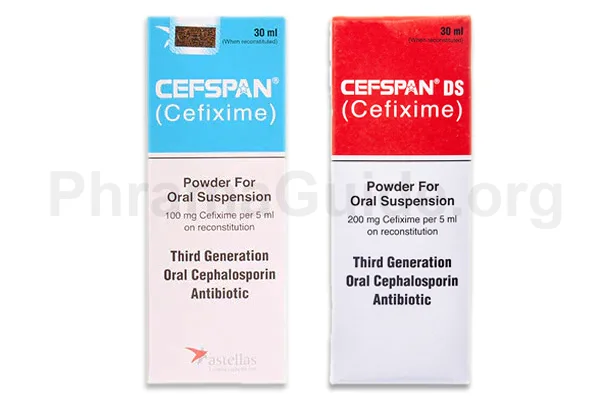Cefspan syrup is an antibiotic medication that belongs to the class of drugs known as cephalosporins. It is primarily used to treat various bacterial infections in both adults and children. The following are some common uses of Cefspan Syrup:
- Respiratory Tract Infections: Cefspan syrup is effective in treating infections such as bronchitis, pneumonia, and sinusitis caused by susceptible bacteria. Using Cefspan syrup helps to alleviate symptoms like coughing, fever, and difficulty breathing.
- Urinary Tract Infections: Cefspan syrup is commonly used to treat urinary tract infections (UTIs) caused by susceptible bacteria. It can help relieve symptoms such as frequent urination, painful urination, and urinary urgency.
- Otitis Media: Cefspan syrup may be used to treat middle ear infections, known as otitis media, particularly in children. It can help clear the infection and reduce ear pain and inflammation.
Off-label Uses of Cefspan Syrup
- Gastrointestinal Infections: Cefspan has been used off-label in the treatment of certain gastrointestinal infections caused by susceptible bacteria.
- Skin and Soft Tissue Infections: In some cases, Cefspan syrup may be used off-label for treating certain skin and soft tissue infections caused by susceptible bacteria.
- Uncomplicated Urinary Tract Infections (UTIs): While Cefspan syrup is commonly used for uncomplicated UTIs, its use may extend to off-label cases where other antibiotics are not suitable or when there is a known susceptibility of the bacteria causing the infection.
- Prophylaxis: Cefspan syrup may be used off-label for prophylactic purposes, such as preventing recurrent UTIs (urinary tract infections) and RTIs (respiratory tract infections) in individuals prone to such infections.

What is Cefspan?
Cefspan Syrup is one of the leading brands of Cefixime in oral liquid form, manufactured and marketed by Barrett Hodgson Pakistan (Pvt) Ltd.
Cefspan Alternatives : Other Cefixime Brands
The following are some available alternative brands of Cefspan Syrup and their manufacturers.
- Cefiget : Getz Pharmaceuticals (Pvt) Ltd, Pakistan.
- Caricef : Sami Pharmaceuticals (Pvt) Ltd, Pakistan.
- Cebosh : Bosch Pharmaceuticals (Pvt) Ltd, Pakistan.
- Cefim : Hilton Pharmaceuticals (Pvt) Ltd, Pakistan.
- Fixitil : Tabros Pharma (Pvt) Ltd, Pakistan.
- Icef : ICI Pakistan Ltd.
- Linzim : Bosch Pharmaceuticals (Pvt) Ltd, Pakistan.
- Magnett : S.J. & G Fazul Ellahie (Pvt) Ltd, Pakistan.
- Maxima : Macter International (Pvt) Ltd.
- Maxpan : Indus Pharma (Pvt) Ltd, Pakistan.
- Mixel : High-Q International.
Cefspan : Available Formulations and Strengths
Presently, Cefspan is available in Syrup and Capsule Forms.
Cefspan Syrup : 100mg/5ml strength
Cefspan DS Syrup : 200mg/5ml strengths
Cefspan Capsule : 400mg strength
Who Should Not Use Cefspan?
Cefspan syrup has certain contraindications, which means there are specific circumstances or conditions in which its use is not recommended.
- Allergy or hypersensitivity: Individuals who have a known allergy or hypersensitivity to Cefspan, other cephalosporins, or any other components of the medication should not take Cefspan syrup. Allergic reactions to Cefspan can range from mild rash and itching to severe reactions such as anaphylaxis, which is a potentially life-threatening allergic response.
- Severe renal impairment: Cefspan is primarily eliminated from the body through the kidneys. Therefore, individuals with severe renal impairment or end-stage renal disease may require a dosage adjustment or an alternative medication. It is important to consult with a healthcare professional who can determine the appropriate dose or alternative treatment options based on the individual’s kidney function.
- Previous severe gastrointestinal reactions: If an individual has experienced severe gastrointestinal reactions, such as colitis or antibiotic-associated diarrhea, associated with previous Cefspan or other antibiotic use, Cefspan syrup may not be suitable. It is crucial to inform your healthcare professional about any previous adverse reactions to antibiotics.
- Neonates: Cefspan syrup is generally not recommended for use in neonates (infants less than 1 month old) due to limited safety and efficacy data in this population.
- Certain medical conditions: Cefspan syrup should be used with caution or avoided in individuals with a history of gastrointestinal disease, especially colitis, as antibiotic use may exacerbate these conditions. Additionally, individuals with known liver disease or impaired liver function should be closely monitored while taking Cefspan.
What is the Recommended Daily Dosage of Cefspan Syrup?
Cefspan Syrup Dose for Children:
- The recommended dose for children is based on their weight and is typically calculated as 8 mg/kg/day. This total daily dose is usually divided into two equal doses given every 12 hours.
- For Example:
A 25kg Child Dose is One teaspoon of Cafspan Syrup two times daily.
A 12 kg Childe Dose is One teaspoon of Cafspan Syrup once daily.
Cefspan Syrup Dose for Adults:
- 400mg capsule or 2 teaspoons of Cefspan DS Syrup once daily.
How Cefspan Works?
Cefspan works by inhibiting the activity of an enzyme called transpeptidase, also known as penicillin-binding protein (PBP). Transpeptidase is involved in the final steps of bacterial cell wall synthesis. By binding to transpeptidase, Cefspan prevents the formation of cross-links in the peptidoglycan layer of the cell wall. This inhibition weakens the cell wall and compromises the integrity of bacterial cells.

Leave A Comment